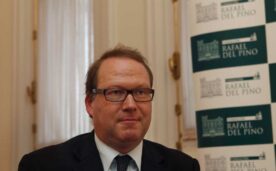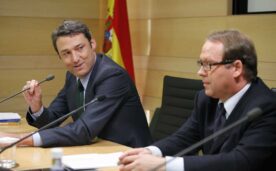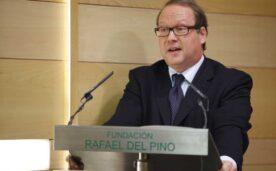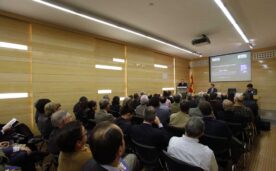On 3 November 2011, the Rafael del Pino Foundation hosted, as part of its Master Lecture programme, the lecture "Stop the euro disaster", given by Max Otte, Director of the Institute for Heritage Development in Cologne (Germany).
Max Otte argued that "[...] It is absolutely necessary that, in the medium term, Greece leaves the Euro to ensure the survival of the single currency. Greece cannot return to a healthy economy as long as it remains in the Eurozone. If it remains a member, its problems will resurface in two or three years and it will eventually be forced to leave the Economic and Monetary Union. I do not know if it will be necessary for other countries, such as Spain or Portugal, to leave the Euro, but it will in any case be a decision for the benefit of their national economies, not a necessity for the survival of the Euro like Greece's exit. At present, Europe is not a common economic area as it needs a common currency. My proposal is that there should be a 'strong Euro' in which the most powerful economies of the European Union, such as Germany and France, participate. But there are certain countries, with very different economies, that could consider 'taking a holiday' from the Euro, returning to their old national currencies and returning, in due course, to the discipline of the single currency. Spain could, for example, return to the Peseta and devalue, in order to favour its exports. In short, it would have more political, more democratic options for reforming its economy. Spain would not have to follow the dictates of Brussels, adopt its own recipes and, in due course, return to the euro. It would certainly be much more democratic, much more flexible and would not damage the common European project, in short. Measures like this would help Europe, because we need the euro and we will keep it. I cannot imagine a return to all national currencies; it is too late for that. It is not possible to think of a European Union, as we know it, without a single currency. If France and Germany go back to the Franc and the Mark, the European project will be seriously damaged".
Max Otte said that the first measures taken in relation to the Greek situation were not intended to help Greece or its citizens: "The credits that were granted to Greece were intended to pay the banks. In reality, it was helping the financial industry. To really help Greece you need a write-off, a restructuring of its debt; all those things, which in reality, have not been done yet. The first year has been wasted maintaining the wrong policies, financing countries with large deficits, like Greece. But, in recent weeks, the approach has been much more realistic, with discussion of measures such as debt relief. Politicians are beginning to realise that just because a country leaves the Euro does not mean the end of the common European project".







